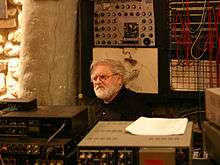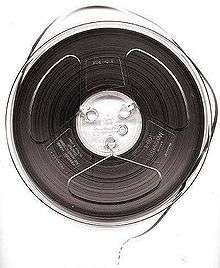Pierre Henry

Pierre Henry (born 9 December 1927) is a French composer, considered a pioneer of the musique concrète genre of electronic music.
Biography
Pierre Henry was born in Paris, France, and began experimenting at the age of 15 with sounds produced by various objects. He became fascinated with the integration of noise into music. He studied with Nadia Boulanger, Olivier Messiaen, and Félix Passerone at the Paris Conservatoire from 1938 to 1948 (Dhomont 2001).
Between 1949 and 1958, Henry worked at the Club d'Essai studio at RTF, which had been founded by Pierre Schaeffer in 1943 (Dhomont 2001). During this period, he wrote the 1950 piece Symphonie pour un homme seul, in cooperation with Schaeffer; he also composed the first musique concrète to appear in a commercial film, the 1952 short film Astrologie ou le miroir de la vie. Henry has scored numerous additional films and ballets.
Two years after leaving the RTF, he founded with Jean Baronnet the first private electronic studio in France, the Apsone-Cabasse Studio (Dhomont 2001).
Among Henry's works is the 1967 ballet Messe pour le temps présent (Dhomont 2001), a collaboration with choreographer Maurice Béjart that debuted in Avignon (Rubin 2001, ). In 1970 Henry collaborated with British rock band Spooky Tooth on the album Ceremony (Rubin 2001, 308).
Composer Christopher Tyng was heavily inspired by Henry's "Psyché Rock" when writing the theme to the popular animated cartoon show Futurama. The theme is so reminiscent of the Henry's song, it is considered a variation of the original (Cohen 2001).
Discography
- 1950 Symphonie pour un homme seul (in collaboration with Pierre Schaeffer)
- 1951 Le microphone bien temperé
- Musique sans titre
- Concerto des ambiguities mit Klavier
- 1952 First film music with musique concrète for Jean Gremillons film Astrologie
- 1953 Orphée 53, experimental opera for Donaueschingen Festival, first stage play with musique concrète (together with Pierre Schaeffer)
- 1955 Arcane (ballet)
- 1956 Haut voltage (ballet)
- 1958 Coexistence
- 1959 Investigations
- 1961 La Noire à Soixante
- 1962 Le voyage (Limelight Records) (also Mercury Living Presence SR90482)
- 1963 La Reine Verte (ballet)
- 1963 Variations pour une porte et un soupir (Variations For a Door And a Sigh) Limelight Records LS 86059
- 1967 Messe pour le temps présent (in cooperation with Michel Colombier), which features "Psyché Rock" on track 2 on side A after a prologue of 1:47 minutes
- 1968 L’Apocalypse de Jean (Die Apokalypse des Johannes) with spoken text
- 1969 Ceremony (with Spooky Tooth)
- 1971 Nijinsky, clown de dieu (ballet)
- 1973 Machine Danse
- 1973 Kyldex I (cybernetic ballet)
- 1975 Futuriste, in memory of the Italian Futurists Luigi Russolo
- 1979 La Dixième Symphonie, tribute to Ludwig van Beethoven
- 1986 La Dixième Symphonie De Beethoven
- 1990 Le livre des morts égyptien (Book of the Dead)
- 1997 Interieur/Exterrieur
- 2015 Choix d'oeuvres de 1950-1985 (Selections of works 1950-1985 on VOD Records Cat VOD133 Edition of 400 on 10xVinyl records)
Documentaries/Films
- French director Jérémie Carboni is filming a documentary on a story of musique concrète including Pierre Henry (Anon. n.d.).
References
- Anon. n.d. Jérémie Carboni. Zerkalo Production website (Accessed 16 August 2011).
- Chion, Michel. 2003. Pierre Henry, new, revised edition. Paris: Fayard. ISBN 2-213-61757-0.
- Clark, Philip. 2009. "Interior Designs: An Interview with Pierre Henry". The Wire (July): 36–39.
- Cohen, David X. 2001. Commentary track to Futurama, Season 1 (television series, 13 episodes). 3 DVD set. Los Angeles: 20th Century Fox Home Entertainment.
- Dhomont, Francis. 2001. "Henry, Pierre". The New Grove Dictionary of Music and Musicians, second edition, edited by Stanley Sadie and John Tyrrell. London: Macmillan Publishers.
- Kennedy, Michael. 2006. The Oxford Dictionary of Music. Oxford and New York: Oxford University Press. ISBN 0-19-861459-4.
- Rubin, Don. 2001. The World Encyclopedia of Contemporary Theatre: Europe. Taylor & Francis.
External links
| Wikimedia Commons has media related to Pierre Henry. |
- Pierre Henry at AllMusic
- "biography" (in French). IRCAM.
- Discography of vinyl records.
- Pierre Henry at Virtual International Philharmonic
- Vinyl recording of prologuePsyché Rock (1967)
